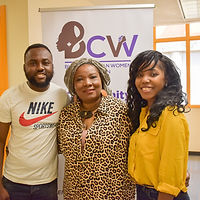ADULTIFICATION OF BLACK GIRLS

ADULTIFICATION OF BLACK GIRLS IN CANADA
Imagine if we lived in a world where Black girls are treated as just girls and not as Adults
Unsurprisingly, we have discovered that Black girls also experience Adultification Bias in Canada.
Adultification bias is a form of racial prejudice where children of minority groups, typically Black children, are treated by adults as being more mature than they actually are. A groundbreaking study by Georgetown law center on poverty and inequality found that adults believe that Black girls need less nurturing, less protection, less support and less comfort. We found that our research shared similar sentiments to the findings from Georgetown.
This research was done for Black Canadian Women in Action (BCW) by Stella Igweamaka and Nana Appah
Welcome to our blog and we invite you to tell your story of dealing with Adultification bias. Stories like yours can contribute in making a change in the society
Our Research Findings
-
Black girls in Canada routinely experience Adultification bias. The Black child goes about with so much pressure to be right, do right and live right. There is so much anticipation that they should be more mature and responsible beyond their age.
-
Black girls are held to a higher standard of behavior than their white counterpart. The resultant effects of Adultification also means that the Black child gets the higher punishment.
-
Adults attempt to enforce traditional white norms of femininity on Black girls.vAttempts to ensure that Black girls conform with traditional white norms of “ladylike” behavior send Black girls the message that they should be less visible, toned down, and hide their true selves in order to conform.
-
Black girls feel unsafe to express themselves and act tough to mask their emotion.
-
Many of these young ones are already cautious, wary of expressing how they truly feel for fear of being roped into existing stereotypes.
-
Gender stereotypes have a huge impact on Adultification. Stereotypes commonly applied to Black women and girls such as certain jobs or activities are for women and certain things are for men also contribute heavily to Adultification.
"I once wore leggings to school and my teachers called me aside that it was inappropriate dressing, meanwhile all of my white friends always wear leggings and they have never called them aside. Mentally, it doesn't feel right to be treated differently. I am same age with my peers. I find it very unfair".
Black girl, 14 years old
“When I was younger, adults frequently treated me as if I knew more than I actually did. My white friend was crying in the corner because she got in trouble, and because I wasn't crying with her, they assumed I was just more mature, but that wasn't the case.
I simply did not cry because there was no point in crying if I did nothing. Just because I wasn't crying didn't mean I was tough or had the mindset of an adult.
Adultification, in my opinion, is when you treat a younger child as if they should know the same things that adults do. This is bad because children are meant to be children. They are supposed to be playful and not worried about things that adults
are concerned about.”
Black girl, 13 years old
“I feel like I have to look really happy, like I am not angry or sad - not just in school, but any
place outside, . If I am sad about something, I try not to look it, so people don’t make assumptions or assume how I am feeling. People
usually think that Black people are angry or they just want to start something. I want to seem just more approachable. So I just try and do that".
Black girl, 13 years old
As Featured In...
Stella Igweamaka was interviewed by Caroline Devaney on Global Edmonton TV discussing the results of this research
An article written on the Adultification Bias on the global insight platform - Research World

About The Research


This research was done for Black Canadian Women in Action (BCW), a bilingual, non-profit organization committed to making a difference in the lives of families in Black Canadian communities by promoting the empowerment of Black Canadian women and girls in all spheres of the society.
The researchers Stella Igweamaka and Nana Appah are research professionals who undertook this research for BCW to compete in the Research Got Talent Competition organised by ESOMAR and Canadian Research Insights Council (CRIC). They represented Canada as part of the global finalists
Credit is given to Eleese Sealy, a program coordinator who worked at BCW and who brought this topic to the knowledge of the team during a brainstorming session

